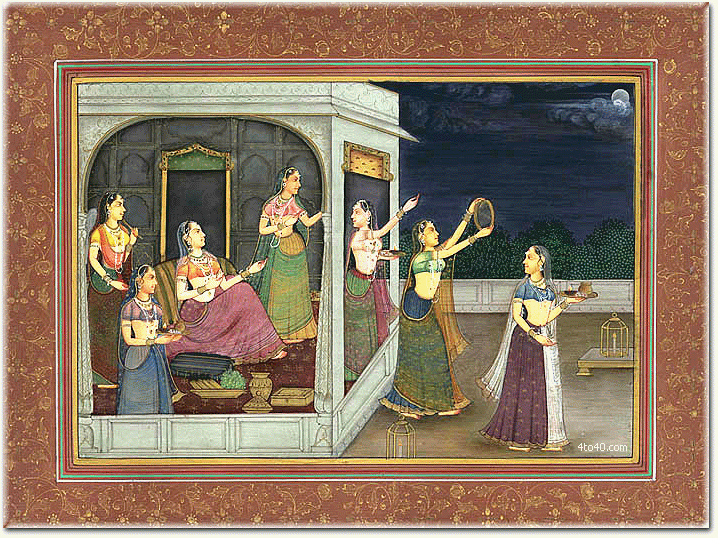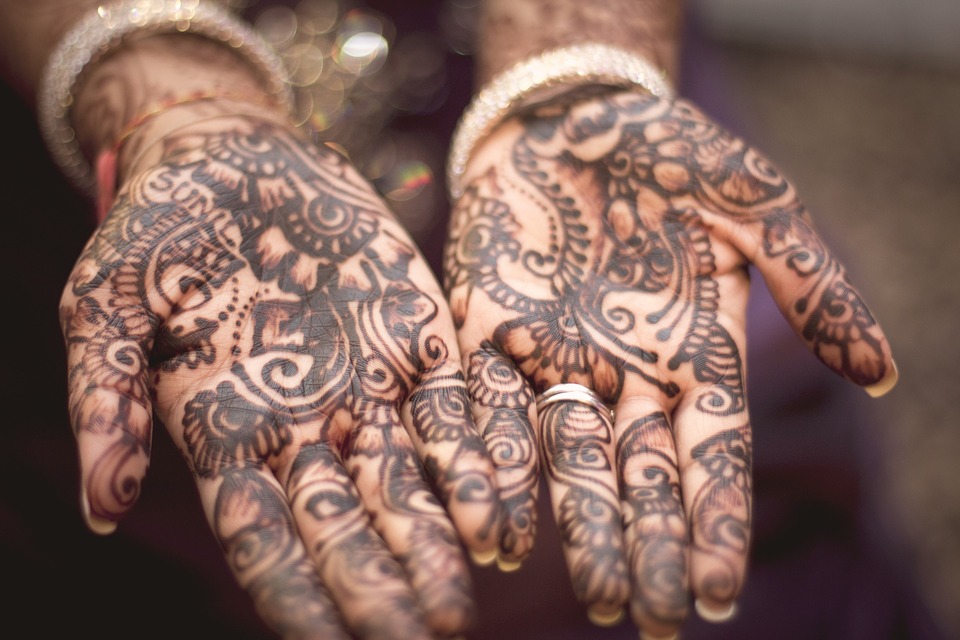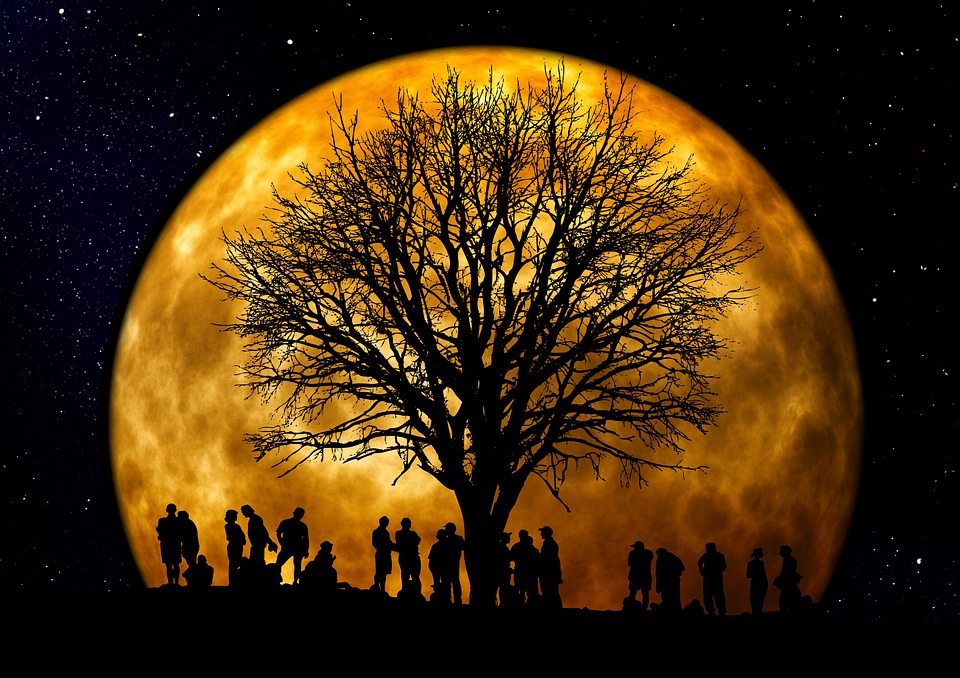Tips for Karva Chauth: Traditional Indian Day of Fasting, Love, Celebration & Rejuvenation

Karva Chauth is an ancient tradition practiced by Hindu women especially in Northern India. During this day which involves a fasting ritual, the woman prays for her husband’s good health and long life. It is a day of celebration of love and togetherness, and of gratitude for all the blessings.
After fasting for the entire day, women dress up in colorful traditional clothing and jewelry in the evenings and pray together in a group before sunset, but eating only after sighting the moon in the presence of their husbands in the night.

The visualization of the moon is a big, but fun challenge for all in the household and community. The mischievous moon is most evasive that night!
This day of fasting and prayer incidentally coincides with the change of the season and the cooling of the weather outside. It is an excellent practice as it detoxifies the body as well as the mind, and what better time to do it than at the change of the season.
Biologically speaking, women are practicing intermittent fasting in this tradition. This allows the body, but especially the gastrointestinal system (including the liver) time to rest and release toxic material (Ama, a term for toxins in Ayurveda), and stimulates body organs to rejuvenate and function better. Do remember that during the fast, there is release of a variety of toxins from the body tissues and this can lead to symptoms of aching, fatigue, brain fog, headache and irritability.
It is better to prepare for the day of fasting by starting to clean up your eating habits from a week before the day of the actual fast. This includes giving up alcohol intake and reducing caffeine. Being prepared will result in less adverse symptoms during the actual fasting period.
A few words of caution:
- If you have an illness like cancer, heart disease, kidney disease or a current infection, fasting may or may not be appropriate for you, so always seek medical advice for your unique situation.
- If you are a diabetic, and on either oral medication or insulin for it, please make sure you eat intermittently and/or change your medication schedule on the day of fasting.
- If you are pregnant please do make sure you are consuming fresh fruits and veggies and water or lemonade during the day.
Always consult with you physician whether it is advisable for you to fast at all.
Tips for the morning of the Karvachauth fast:
Traditionally women eat Sargi (a snack) after prayers and before sunrise on the day of the fast. Try to eat protein rich foods, and not eat a high sugar or carbohydrate laden meal. The latter will cause blood sugar fluctuations during the day which will make you more hungry and irritable. Protein, on the other hand, stabilizes mood and blood sugar keeping you full longer.
Nuts are a great option as they not only contain protein but also have excellent essential fats which nurture the brain and body throughout the day.
Make sure to hydrate very well in the morning especially if you follow a strict “no-water” fast!
The fun part:
Remember fasting is not just a ritual for the body, it is also rejuvenation for the mind and our opportunity to return to the wholeness of our souls. It is your time to relax & regenerate! So make the most of it!

A few tips for relaxation & rejuvenation:
- Listen to soothing music,
- Practice meditation or mindfulness,
- Try pranayama (breathing techniques),
- Try restorative yoga techniques or corpse pose (Shavasana) with the intention to heal the body, mind and soul,
- During the day if you have the luxury to be off work (or at least take half a day off!), try to pamper your self with a spa massage or at least do a self-massage (self -abhyanga)
- Don’t over-exert physically or mentally. Read your favorite book.
- If you’re ok with consuming water during the fast, sip some chamomile tea or other herbal teas
- Take a warm bath with a few drops of your favorite essential oils, especially if you feel fatigue, headache, or body aches.
- If nothing else, take a nap or just go see a movie with your friends.
Celebrate YOU!
This is your chance!
Tip on breaking your fast:
After the evening puja (prayer typically done with a gathering of friends), start with a glass or two of room temperature or luke-warm water. You can even add a little lemon, himalayan salt, and honey to the water. Natural, unsweetened coconut water is also a great option for slowly introducing electrolytes back into the body.
I find most women craving for tea or coffee, but those probably are not good ideas as they can cause gastric distress and even nausea.
I would also not recommend consuming any ice cold fluids.

Typically the moon is notorious for playing hide and seek within the clouds on the day of Karva Chauth! Once you’re fortunate enough to having a viewing (hopefully an early one!), follow these tips to introduce food after your fast in a healthy way:
After the moon is out and finally the fast is broken, please venture slowly into eating again.
First add in some fresh fruits in small amounts. Then after a little while have your dinner.
Fresh home made yogurt or coconut kefir (if you are dairy sensitive) are great as they help in the digestion of nutrients which the body greatly needs after a full day of starvation.
Moog lentil soup (daal) with a little white basmati rice and ghee are great options along with some easy to digest well cooked vegetables.
Eating fried and oily foods may be counterproductive as those are harder to digest and our stomach’s digestive fire (agni, an Ayuvedic term) as well as our pancreas may not be ready for such heavy foods.
Finally enjoy and celebrate your time with family and friends!
Many of my patients over the years have asked me to advise them on some tips to fast safely, so I decided to write this blog. Hope you found it useful.
I would love to hear from you about your experiences and any other tips you may have…
Please share and reach me through my social media or email me through my website.
Image source: http://www.4to40.com/greetings/cards.asp?festivals=Karva_Chauth-Karwa_Chauth-163
websol November 20th, 2015
Tags: celebration, detox, detoxification, Fasting, Food, Hindu, India, Indian, Intermittent fasting, Karva Chauth, love, rejuvenation, tradition
